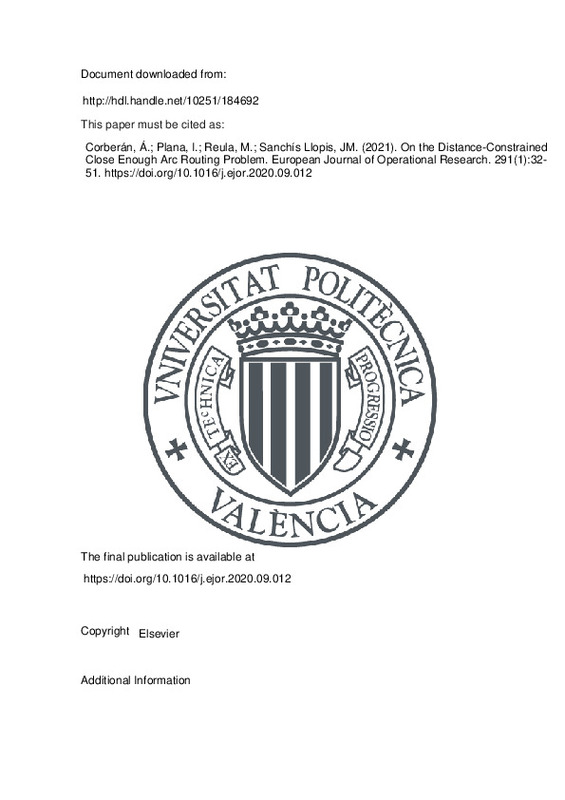JavaScript is disabled for your browser. Some features of this site may not work without it.
Buscar en RiuNet
Listar
Mi cuenta
Estadísticas
Ayuda RiuNet
Admin. UPV
On the Distance-Constrained Close Enough Arc Routing Problem
Mostrar el registro sencillo del ítem
Ficheros en el ítem
| dc.contributor.author | Corberán, Ángel
|
es_ES |
| dc.contributor.author | Plana, Isaac
|
es_ES |
| dc.contributor.author | Reula, Miguel
|
es_ES |
| dc.contributor.author | Sanchís Llopis, José María
|
es_ES |
| dc.date.accessioned | 2022-07-22T18:06:13Z | |
| dc.date.available | 2022-07-22T18:06:13Z | |
| dc.date.issued | 2021-05-16 | es_ES |
| dc.identifier.issn | 0377-2217 | es_ES |
| dc.identifier.uri | http://hdl.handle.net/10251/184692 | |
| dc.description.abstract | [EN] Arc routing problems consist basically of finding one or several routes traversing a given set of arcs and/or edges that must be serviced. The Close-Enough Arc Routing Problem, or Generalized Directed Rural Postman Problem, does not assume that customers are located at specific arcs, but can be serviced by traversing any arc of a given subset. Real-life applications include routing for meter reading, in which a vehicle equipped with a receiver travels a street network. If the vehicle gets within a certain distance of a meter, the receiver collects its data. Therefore, only a few streets which are close enough to the meters need to be traversed. In this paper we study the generalization of this problem to the case in which a fleet of vehicles is available. This problem, the Distance-Constrained Close Enough Arc Routing Problem, consists of finding a set of routes with minimum total cost such that their length does not exceed a maximum distance. In this article, we propose a new formulation for the Distance-Constrained Close Enough Arc Routing Problem and present some families of valid inequalities that we use in a branch-and-cut algorithm for its solution. Extensive computational experiments have been performed on a set of benchmark instances and the results are compared with those obtained with other heuristic and exact methods. | es_ES |
| dc.description.sponsorship | This work was supported by the Spanish Ministerio de Ciencia, Innovacion y Universidades (MICIU) and Fondo Social Europeo (FSE) through project PGC2018-099428-B-I00. The authors want to thank the comments and suggestions done by two anonymous referees that have contributed to improve the content and readability of the article. | es_ES |
| dc.language | Inglés | es_ES |
| dc.publisher | Elsevier | es_ES |
| dc.relation.ispartof | European Journal of Operational Research | es_ES |
| dc.rights | Reconocimiento - No comercial - Sin obra derivada (by-nc-nd) | es_ES |
| dc.subject | Routing | es_ES |
| dc.subject | Distance constraints | es_ES |
| dc.subject | Close-enough | es_ES |
| dc.subject | Rural Postman | es_ES |
| dc.subject | Branch and cut | es_ES |
| dc.subject.classification | MATEMATICA APLICADA | es_ES |
| dc.title | On the Distance-Constrained Close Enough Arc Routing Problem | es_ES |
| dc.type | Artículo | es_ES |
| dc.identifier.doi | 10.1016/j.ejor.2020.09.012 | es_ES |
| dc.relation.projectID | info:eu-repo/grantAgreement/AEI/Plan Estatal de Investigación Científica y Técnica y de Innovación 2017-2020/PGC2018-099428-B-I00/ES/ANALISIS Y RESOLUCION DE PROBLEMAS DE RUTAS DE VEHICULOS Y LOCALIZACION DE SERVICIOS/ | es_ES |
| dc.rights.accessRights | Abierto | es_ES |
| dc.contributor.affiliation | Universitat Politècnica de València. Departamento de Matemática Aplicada - Departament de Matemàtica Aplicada | es_ES |
| dc.description.bibliographicCitation | Corberán, Á.; Plana, I.; Reula, M.; Sanchís Llopis, JM. (2021). On the Distance-Constrained Close Enough Arc Routing Problem. European Journal of Operational Research. 291(1):32-51. https://doi.org/10.1016/j.ejor.2020.09.012 | es_ES |
| dc.description.accrualMethod | S | es_ES |
| dc.relation.publisherversion | https://doi.org/10.1016/j.ejor.2020.09.012 | es_ES |
| dc.description.upvformatpinicio | 32 | es_ES |
| dc.description.upvformatpfin | 51 | es_ES |
| dc.type.version | info:eu-repo/semantics/publishedVersion | es_ES |
| dc.description.volume | 291 | es_ES |
| dc.description.issue | 1 | es_ES |
| dc.relation.pasarela | S\425785 | es_ES |
| dc.contributor.funder | European Social Fund | es_ES |
| dc.contributor.funder | AGENCIA ESTATAL DE INVESTIGACION | es_ES |







![[Cerrado]](/themes/UPV/images/candado.png)

